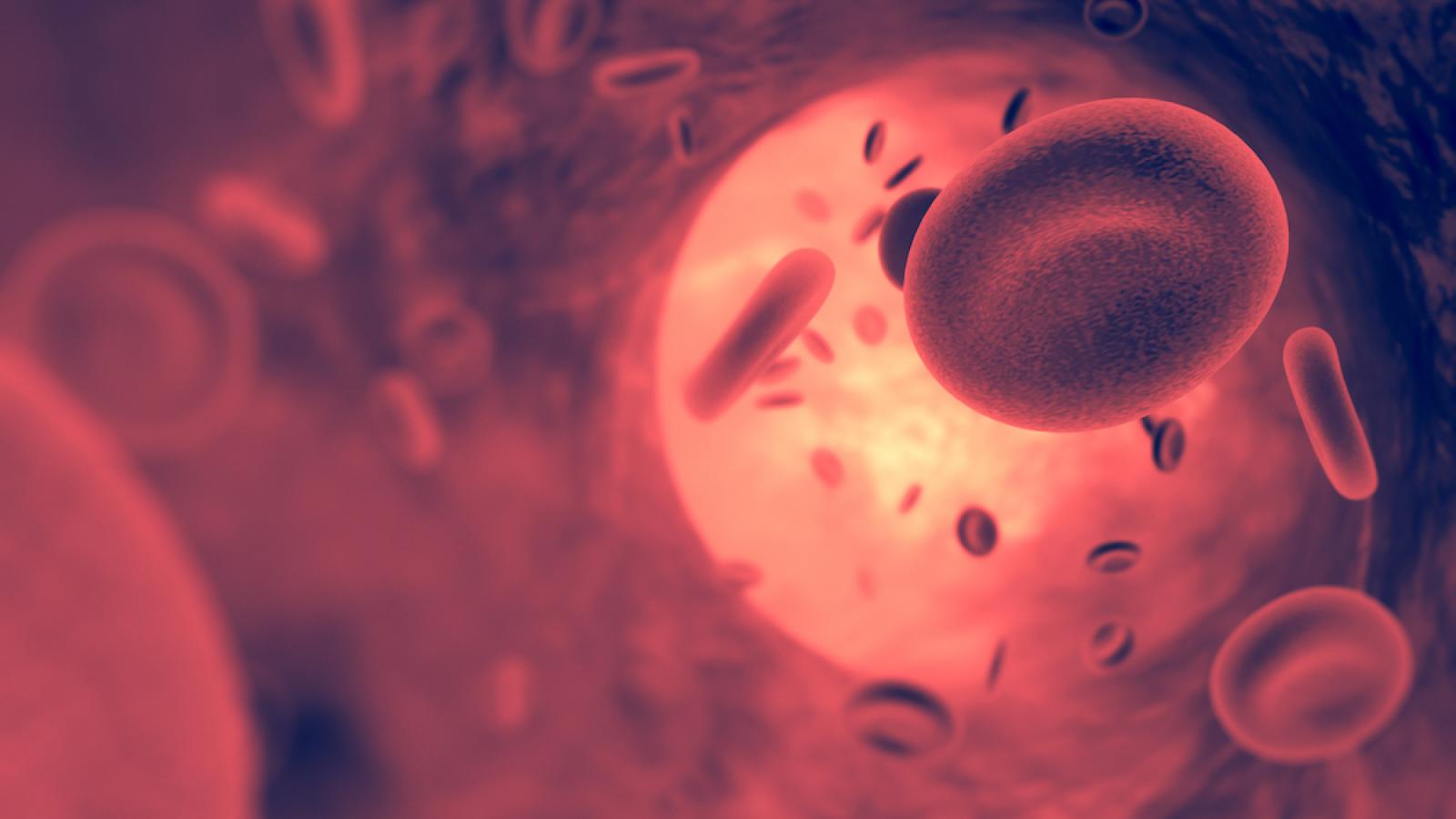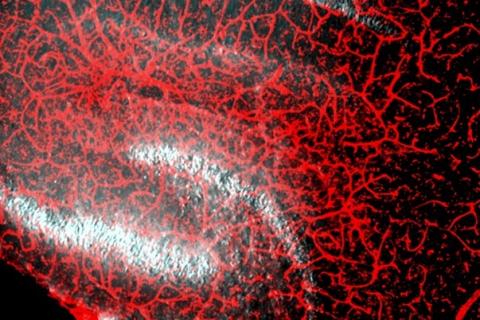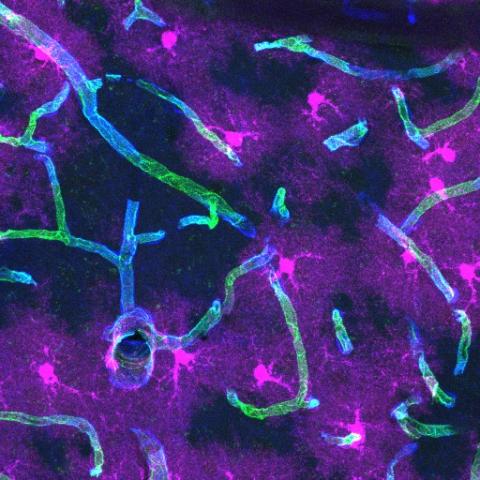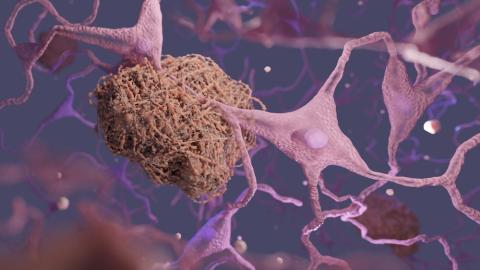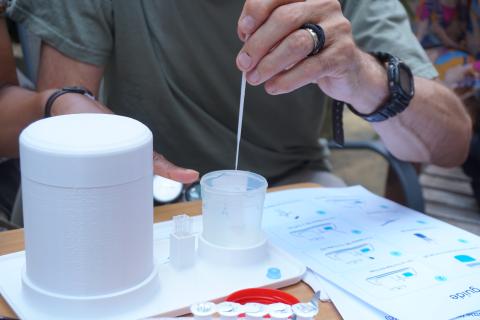What is vascular dementia?
Vascular dementia is one of the most common types of dementia, affecting around 180,000 people in the UK1.
It differs from other types of dementia because it is caused by conditions that reduce or block blood flow to the brain. This deprives brain cells of the oxygen and nutrients they need to function properly, leading to irreversible damage. This loss of brain cells can lead to a variety of problems for people living with the condition.
Vascular dementia cannot currently be cured, but treatments targeting the underlying causes of the reduced blood flow to the brain can help reduce the risk of further damage to brain tissue.

Frequently asked questions
- How common is vascular dementia?
Vascular dementia is one of the three most common forms of dementia (along with Alzheimer’s and Lewy body dementia).
The risk of developing vascular dementia increases significantly with age2. Once a person reaches the age of 65, their risk of developing the condition doubles roughly every five years. Younger individuals can also develop the condition, but this is rare, with only around 8,000 younger people in the UK living with vascular dementia.
- What are the symptoms of vascular dementia?
Vascular dementia symptoms vary from person to person and can appear suddenly or gradually. Depending on the location and severity of damage to the brain, vascular dementia symptoms can include:
- Memory loss: Difficulty recalling recent events or information.
- Confusion: Episodes of disorientation or confusion, particularly after a stroke or vascular event.
- Problems with planning and organising: Difficulty in managing tasks that require forward planning or problem-solving.
- Attention and concentration: Reduced ability to concentrate or maintain attention on tasks. Having conversations may be difficult.
- Language difficulties: Finding the right words to say.
- Mood and personality changes: Depression, anxiety, or apathy can be seen with the condition, as can increased irritability or agitation.
There’s more information about symptoms on the British Heart Foundation website.
- How is vascular dementia diagnosed?
If you are worried that you or someone else is showing symptoms of vascular dementia, the first thing to do is speak to your GP. In most cases, they can make referrals to specialist clinics, which can do a more in-depth assessment.
Multiple tests are used to diagnose vascular dementia. Health professionals will look at a variety of aspects and will speak to the person and someone who knows them well to understand their medical history.
Brain scans (an MRI or CT) are used to assess the presence and extent of any blood vessel related damage. Blood tests and other physical examinations can be used to help rule out possible causes of the symptoms. Tests are also performed to check how well the person can think or solve problems as a reduction in thinking speed is a more common symptom of vascular dementia than memory loss is.
- What treatments are there for vascular dementia?
Various treatments are available which can help manage the symptoms of vascular dementia, improve quality of life, and reduce the risk of further reduced blood flow to the brain. In the UK, the approach to treating vascular dementia typically involves a combination of lifestyle changes, medication, and supportive therapies.
A healthy diet and regular physical activity can improve cardiovascular health and reduce the risk of further vascular damage. Eating more healthy foods like fruit and vegetables, whilst cutting out processed foods or those with high levels of salt and saturated fat is recommended. Quitting smoking also significantly reduces the risk.Medication options include ACE inhibitors to reduce blood pressure, or statins to lower cholesterol.
Supportive therapies such as cognitive therapy are designed to stimulate thinking skills and engage people. When group-based, they also encourage socialising and, with the addition of speech therapy, can help to improve communication problems. For those experiencing problems with balance, physical therapy can help improve mobility, increase strength and reduce the overall risk of falling.More information on the different treatment options for vascular dementia can be found on the British Heart Foundation website.. Find out more about reducing the risk of dementia on the UK DRI's dedicated support page.
- How can I get involved in research and trials for vascular dementia?
We recommend visiting the Join Dementia Research website. It’s a national service that connects volunteers with researchers who are looking for people to take part in their studies and includes opportunities for both people living with vascular dementia and healthy individuals to contribute to research.
- What support is available for people affected by vascular dementia?
Support is crucial, not only for those living with vascular dementia, but also for their families and carers. For more information about support available, visit our page on ‘support for people affected by dementia’.
What are the causes of vascular dementia?
This type of dementia is caused by reduced blood flow to the brain, which deprives brain cells of the oxygen and nutrients they need to function properly. This reduction in blood flow can result from a variety of conditions, such as stroke, small vessel disease, or other issues that damage blood vessels, and it can lead to significant cognitive impairment, especially if multiple strokes occur over time.
Small vessel disease is one of the most common causes of vascular dementia. It refers to blockages (usually due to high blood pressure, high cholesterol and/or high blood sugar) in tiny vessels deep within the brain, which lead to tiny areas of damage. This damage usually goes unnoticed at first, but over time these tiny areas can progressively accumulate, leading to gradual slowing of thinking and other cognitive problems.
Interest in the vascular contributions to neurodegeneration has intensified in recent years. Our researchers and clinicians are combining their wealth of expertise in this research area to decipher the fundamental biology underlying vascular contributions to disease and where potential treatment opportunities may lie.
Surrounding our brain is the richest and most specialised blood vessel network in the body, called the blood-brain barrier (BBB). It is composed of multiple cell types, which act together to create an extremely selective barrier and maintain the optimal microenvironment for the brain it protects. Its dysfunction and breakdown are implicated in the earliest stages of several neurodegenerative conditions. Our researchers are investigating why this occurs with the aim of finding ways to support this specialised structure into age and as these diseases progress. Find out more about vascular contributions to dementia on our topic page.
There is growing evidence that the reduced incidence of dementia in some countries is due to improved cardiovascular health3, as a result of interventions such as reducing hypertension. In addition to the development of new treatments, taking existing drugs and repurposing them to tackle dementia could offer a faster route to effective treatments. Promising results were recently seen in a study led by Prof Joanna Wardlaw showing that two cheap and common drugs used for other heart and circulatory diseases could be harnessed as the first specific treatment for people who experience a type of stroke linked to nearly half of all dementias.
To further support our ambitions in vascular research, in 2023 we established a partnership with the British Heart Foundation to develop the UK’s first research centre dedicated to finding new treatments to prevent and halt vascular dementia. Through cutting-edge research the centre aims to unravel the molecular and cellular mechanisms underlying vascular dementia and to develop targeted therapeutic interventions. Find out more about The BHF – UK DRI Centre for Vascular Dementia Research here.
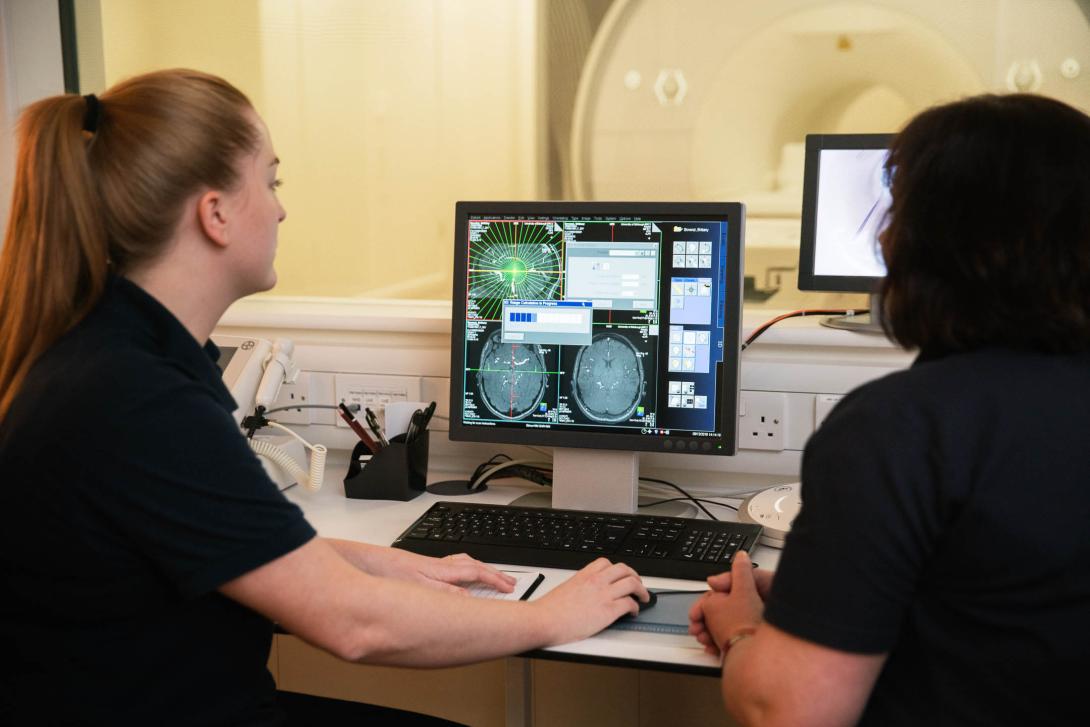
Superintendent Radiographer Charlotte Jardine and colleague examines brain scans for signs of small vessel disease. Credit: Edinburgh Imaging Facility
Latest news



